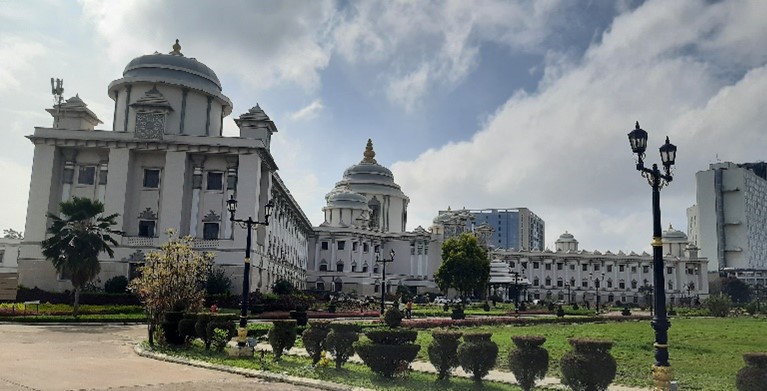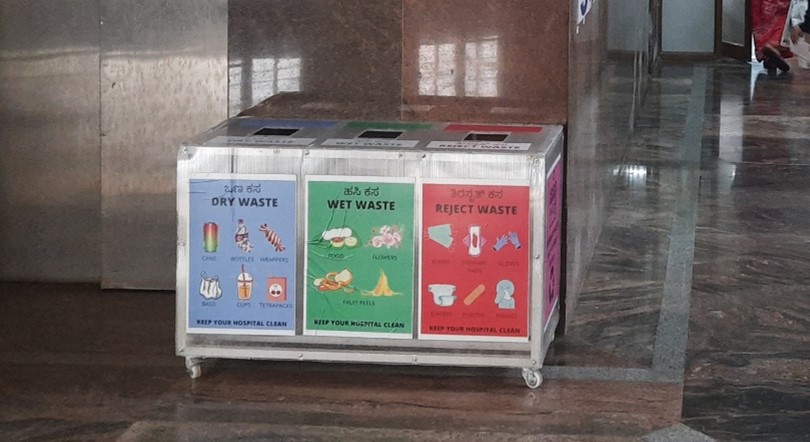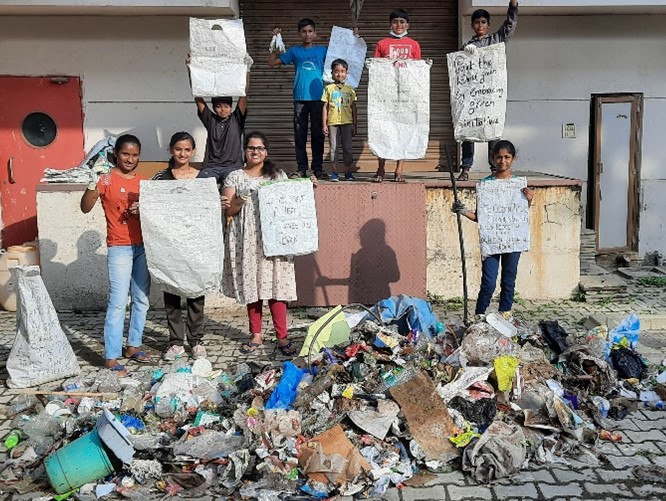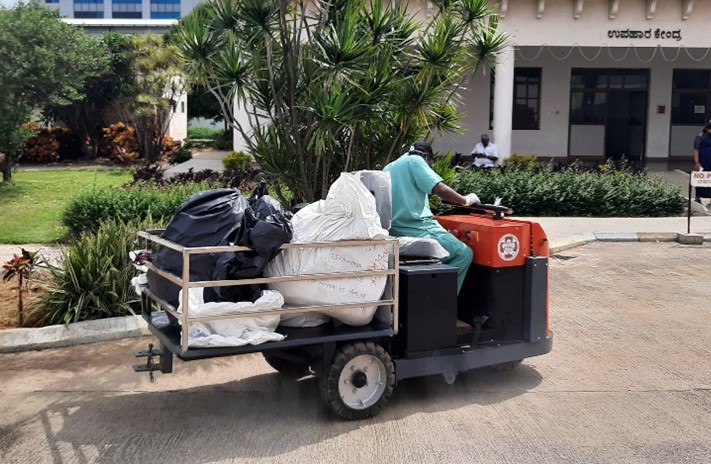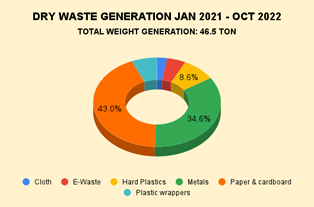Dry Waste Management – Segregation is the key to success
Link to PDF article Case Study – Dry Waste Segregation – GGHH – Nov 22
Sri Sathya Sai Institute of Higher Medical Sciences (SSSIHMS), Bangalore, India.
Demographic information
Region: Bangalore, Karnataka
Country: India
Number of staff: 400
Number of beds: 333
Type of institution: Tertiary healthcare Institute (100% charitable)
The Institute is a unit of the Medical Care Division of Sri Sathya Sai Central Trust, a public-charitable Trust set up in 1972. SSSIHMS, Bangalore was set up in January 2001, with the mission of providing high-quality medical care free of charge to all, irrespective of caste, creed, race or religion. The campus is spread over 52.23 acres and consists of the main hospital building, residential quarters, canteens, dormitories for volunteers, attendants etc.
GGHH agenda goals
- Waste
Case study summary
The case study highlights the efforts of SSSIHMS in solid waste management, and the importance of waste segregation at source, which helps in recycling resources through authorized recyclers.
The issue
The Institute was faced with the challenge of disposing of packaging waste, especially single-use plastic wrappers and paper wrappers, which do not have any economic value. The dry, recyclable waste, sometimes mixed along with organic waste, was being disposed of in black covers as per local waste management norms through the municipality, on payment basis.
Due to lack of awareness amongst the patients and attendants, waste was not being segregated at the outpatient department (OPD) and inpatient department (IPD) levels and there was not adequate infrastructure/awareness regarding the impact of mixing up of waste. This led to inadequate waste recovery and disposing of waste in landfills.
Hospital goal
- Reduce waste generation as much as possible and minimize unsegregated waste.
- Improve resource recovery from waste as applicable.
Sustainability strategy implemented
Considering long-term sustainability, and rising costs of waste disposal, efforts were initiated by the Institute in 2021 to reduce waste generation, implement waste segregation at source and recycle/monetize the waste generated as much as possible.
The relevant Solid Waste Management Rules also mandate bulk generators of waste to manage in-house the waste they generate.
Stepwise Implementation process
- Visiting downstream recipients of the waste being generated, viz. pig farm for food waste, municipal contractor for mixed waste, biomedical and e-waste handlers to understand the waste handling process.
- Sensitization of key stakeholders and hospital staff to the challenges in waste management practices and highlight the need for process improvement through presentations.
- Constitution of Waste Management Committee, as a sub-committee of the Hospital Infection Committee, to oversee the waste handling, storage and disposal process.
- Setting up of bins for dry waste collection in wards & OPDs and consolidating their storage in the Central Stores. A total of 8 categories of dry waste bins were set up in the central location as follows:
- Paper & paper wrappers
- Cardboard
- Plastic wrappers (LDPE, single-use plastic etc.)
- Polystyrene
- Hard plastics (HDPE, PET etc.)
- Metals (mild steel, stainless steel, aluminum, brass, copper)
- Glass
- E-waste
The Institute entered MoUs with authorized recyclers for dry waste (handling multiple categories of dry waste) and e-waste. The dry waste recycler collects the waste once every month and the e-waste vendor collects the waste, as per need (min 500 kg).
Tracking progress
At the end of each month, the authorized recycler collects all the waste accumulated over the month, weighs it and transports it in their vehicle to the yard for further segregation/sale.
The success was measured in terms of the weight of items picked up by the recycler in each category. The recycler provides the Institute with a periodic Environmental Impact Report, which is part of the Hospital’s annual newsletter.
Progress achieved
Prior to entering an MoU with the authorized recyclers, the unsegregated wastes as well as recyclables were given to a vendor who charged a fee. The vendor would retrieve whatever they found valuable and send rest of the waste to landfill/incinerators. In the 24 months since signing MoUs with the authorized recyclers, 46.5 tons of dry, recyclable waste has been sent for recycling to various vendors. While there are economic benefits from the sale of scrap (approx. Rs. 9.5 lakh or USD 12,000 during Jan 21-Oct 22), the environmental benefits are perceived to be far greater.
Challenges and lessons learned
The exercise brought to the fore the enormity of the problem of waste management and the day-to-day challenges being faced by the downstream vendors. The visits to down-stream vendors helped develop empathy towards waste handlers and helped in formulating the “why” of improving waste management practices within campus.
Behaviour change is the major challenge experienced during the journey. The leadership of the Institute including the Director and the Secretary-Infection Control Committee along with work put in by the housekeeping staff on the ground, contributed to the success so far. Getting people on board through awareness building about the need for waste segregation and proper disposal helped change the narrative around waste.
There were significant contributions from volunteers, who participated in monthly litter collection activities on campus and other waste-handling initiatives, which played a vital role in the success of the project.
Next steps
After making progress in the disposal of dry, recyclable waste in the Institute, focus is now on the following:
- Study biomedical waste generation for possibilities of resource recovery, through proper segregation.
- Management of organic waste, including food and garden waste. A pilot aerobic composting unit has been set up to compost the food waste from the residential campus. A couple of leaf composters have also been set up to handle the leaf litter.
- Reduction of mixed, unsegregated waste in the residential campus of SSSIHMS, and the public and volunteer canteens.
- Ensuring future conferences and events are zero-waste events which do not generate any mixed waste.
The concepts of circularity will continue to be explored to avoid waste of all types across the Institute. There is also an aspiration that this program will expand to other institutions, run by Sri Sathya Sai Central Trust, and serve as a model for other healthcare institutions.
Links
- https://www.sssbpt.info/ssspeaks/volume29/d960718.pdf Link to Bhagwan’s discourse urging not to waste natural resources.
- https://sssihms.org/
- https://recykal.com/
- https://ewasteindia.com/
- https://www.globalwmcindia.com/

